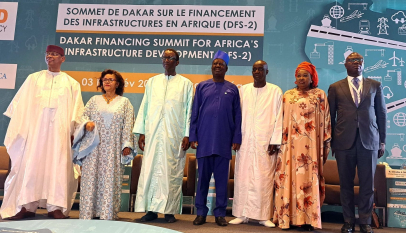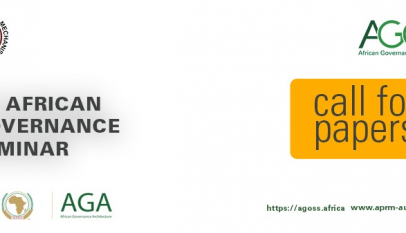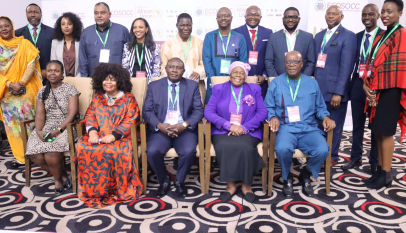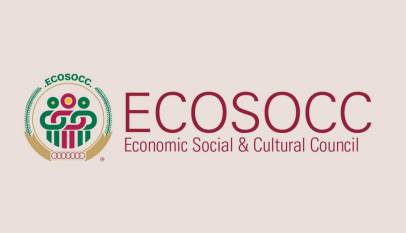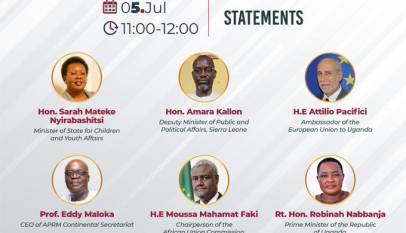INTERVIEW | How APRM positioned governance at centre stage of AU’s agenda – Batlokoa Makong
Batlokoa Makong, the African Peer Review Mechanism’s liaison officer to the African Union, speaks about the Mechanism’s strides as the AU’s self-assessment instrument whose mission is tracking of the implementation of the Union’s key governance initiatives including monitoring and evaluation of AU Agenda 2063 and SDGs 2030
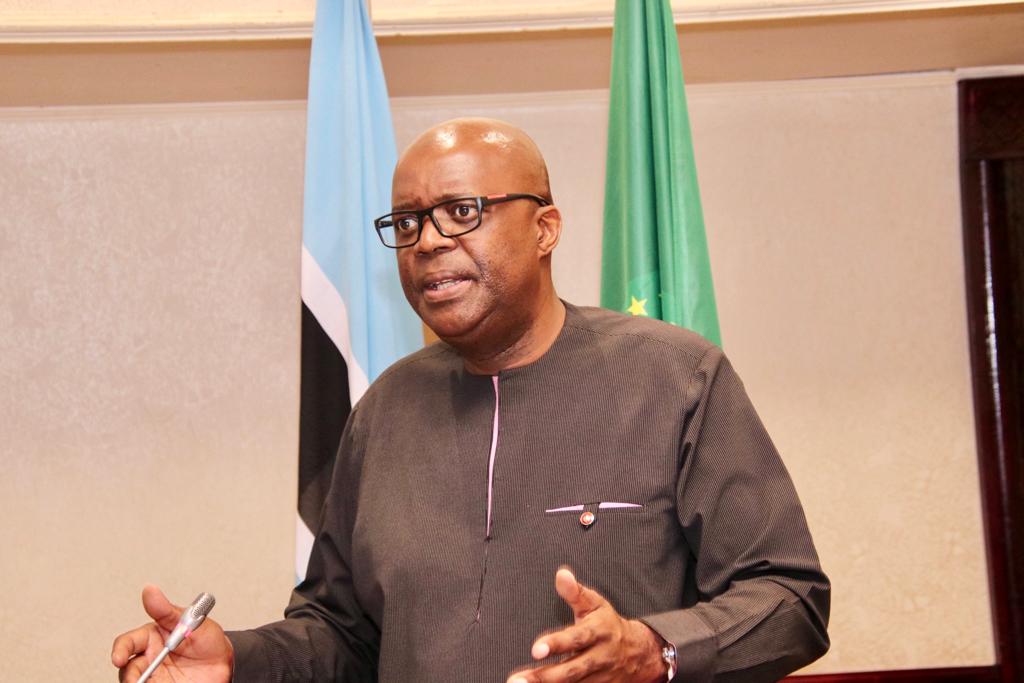
Can you tell us about the African Peer Review Mechanism (APRM) and its mandate as a specialized agency of the African Union?
The African Peer Review Mechanism (APRM) was established in 2003 by the Heads of State and Government of the African Union under the auspices of the New Partnership for Africa’s Development (NEPAD) [Now African Union Development Agency (AUDA-NEPAD)]. The legal instrument that operationalized the APRM was the APRM Base Document. We have always worked on the basis of that document until August 2016 when we adopted the APRM Statute on the revitalization of the APRM, in Nairobi, Kenya.
Earlier, in July 2008 at Sharm El Sheikh, Egypt, the AU Assembly decided to integrate the APRM into the AU; they basically decided that the African Peer Review (APR) Forum of Heads of State and Government; the APR Secretariat and the APR Panel of Eminent of Persons shall be part and parcel of the structures of the Union. That decision was reaffirmed at Malabo, Equatorial Guinea, in 2014.
Basically, the APRM is a self-assessment mechanism of the AU Member States that is voluntarily acceded to through the signing of a Memorandum of Understanding (MoU), the assessment’s mission is to promote democracy, governance, human rights, as per the AU’s Declaration on Democracy, Political, Economic and Corporate Governance. I will also like to highlight the fact that between 2003 and 2008, the APRM was an entity of the AU Member States – and not an entity of the AU.
How has the APRM fared in the last fifteen years, in terms of successes and challenges?
The major success of the APRM is that we are one of the few AU institutions that have been able to maintain functional autonomy as far as our assessments are concerned; we have relied on African resources, we have always utilized African experts, and we have maintained the credibility of our assessment process. We have never compromised the principles underpinning the APRM. Secondly, in the last fifteen years, we have been able to move the APRM from the periphery to the centre of the AU governance architecture; we are now part and parcel of the African Governance Architecture Platform (AGA Platform) and are currently chairing the Platform.
In November, 2018, giving the importance of the APRM, the AU Assembly decided to integrate the budget of the APRM into the budget of the AU, which is also a huge success, it has now made the Mechanism sustainable in the long run. The budget constraints we faced in the past made it almost impossible to execute our mandate. Before this decision, our sources of funding were mainly contributions of Member States and funding from strategic partners that were supporting certain programmes of ours. With Member States facing difficult economic conditions, it was very difficult to honour their contributions; now, our funding comes directly from the AU.
We are now at the last stage of being fully integrated into the AU, we have developed a legal framework that clearly articulates our integration into the AU. We have adopted all the AU normative frameworks as far as operational mechanism is concerned namely staff regulations, financial regulations etc. Also under the auspices of the reform process, as a Mechanism, we have been able to put governance at the centre stage of the agenda of the Union. Our major challenges had been failure of Member States to adhere to their contributions to the Mechanism. When the Mechanism was established, each Member States were expected to contribute one hundred thousand US dollars, annually.
A revitalization programme was initiated by our current CEO, Prof Eddy Maloka, who has done a sterling job in terms of revitalizing the APRM, with the support of staff of the secretariat, Committee of Focal Points, and Panel of Eminent Persons. Before his appointment, for a number of years, we were not doing any assessment because Member States were not honouring their commitments to be assessed every two years. The Mechanism was basically collapsing! So, the appointment of the current CEO brought about the revitalization of the Mechanism as contained in his first strategic plan.
The plan has begun to bear fruits because all the strategic objectives of the strategic plan including revitalization and integration have been met. We are now going into the implementation of the second strategic plan. Most importantly, we didn’t have a proper legal framework, except for the Base Document. So, we faced a number of internal governance challenges however, under the guidance of the new CEO and with the support of the overall staff of the APRM, we have now managed to adopt the first APRM Statute, which has already entered into force within the AU.
The APRM was able to bring governance to the centre stage of the agenda of the Union for which the Assembly gave the APRM an expanded mandate, over and above the core mandate of the self-assessment of Member States. The mandate is to monitor key areas of governance on the continent, in particular, Aspiration 3 (An Africa of good governance, democracy, respect for human rights, justice and the rule of law) and Aspiration 4 (A peaceful and secure Africa) of Agenda 2063; as well as Goal 16 (Peace, Justice and Strong Institutions) of UN Agenda 2030.
We have also been given the mandate to position the APRM to serve as an early warning tool for conflict prevention on the continent, working in harmony and synergy with the Africa Governance Architecture (AGA) and the African Peace and Security Architecture (APSA). We also got the mandate to support Member States in their engagement with international credit rating agencies; currently, the agencies basically assess Member States only on the basis of governance – and not economy.
Based on the assessment work of the APRM across Member States of the AU who have acceded to the Mechanism, how well can you say African countries are doing in terms of governance?
The issue of African Renaissance or rather renewal of Africa was at the center stage of the agenda of the Organisation of African Unity (OAU) during its last days. So, President Thabo Mbeki (South Africa); President Olusegun Obasanjo (Nigeria); President Abdelaziz Bouteflika (Tunisia) and President Abdoulaye Wade (Senegal) came up with NEPAD to be the anchor for Africa’s renaissance, both in terms of economic development and governance. The APRM came into being as a programme of NEPAD with the mandate to promote the issues of democracy, governance, rule of law, elections, human rights and respect for judiciary – which took the center stage of the agenda of the AU.
From 2003, the issue of governance has always taken the centre stage however; the issue of governance has always been overshadowed by the issue of peace and security on the continent, as such all the development partners were funding peace and security – and not governance. So, we thought good governance could be a major preventive mechanism for conflicts. Therefore, as a Mechanism, we were able to put the issue of governance at the centre stage, at least, at par with the issue of peace and security.
At the AU, every year, there is a report that is considered by the Assembly on the state of peace and security in Africa and the activities of the Peace and Security Council (PSC). Now, after every two years, we are also going to have a similar report on the state of governance in Africa – the issue of governance is already at the centre of the continental agenda. We have also put the African Charter on Democracy, Elections and Governance (ACDEG) at the core of our assessment missions of AU member States that are parties to the APRM.
And most importantly, since APRM is a voluntary mechanism, the Assembly has decided that as part of the ten year implementation plan of Agenda 2063, by 2023 – which is 10 years after the coming into force of Agenda 2063 – all AU Member States will also be members of the APRM, by acceding to the Mechanism. We have moved from having 28 members of the APRM in 2013 to 38 members in 2019; more than two-third of the AU Member States are now members of the APRM. We are now working on a model law to guide Member States on establishing national structures; being the only AU institution that is supposed to have national secretariats across all Member States.


